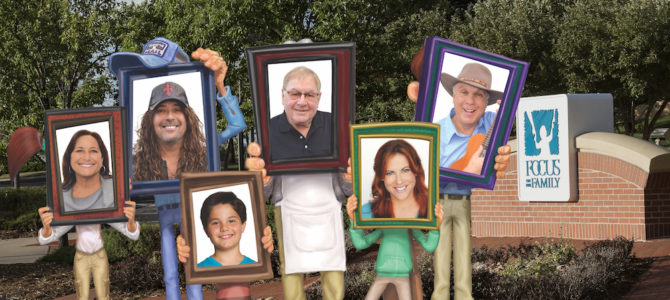
When Vice President Mike Pence arrived in Colorado Springs this summer to speak at Focus on the Family, the staff and their families packed out the chapel auditorium. The former Indiana congressman referred to current political battles, including health care reform. But one anecdote, which got knowing glances and laughs from the Focus crowd, made little sense to reporters in attendance.
“Every time we took the 600-mile drive from Washington, D.C. back to Indiana, I can promise you we spent an awful lot of time with Connie, Eugene and Whit at Whit’s End,” said Pence. “The adventures in Odyssey were our adventures. And I remember so often the kids saying, ‘Put in another tape.’”
Pence was referring to the characters of “Adventures in Odyssey,” an audio drama that has gone from cassette tapes to its own mobile app and a podcast climbing iTunes charts. This month, the values-driven show marks 30 years since it premiered.
Whether due to a dearth of family-friendly entertainment, ’80s nostalgia, or the surprisingly broad reach of radio, millions are tuned in to “Adventures in Odyssey.” Seeking to entertain as well as teach, the audio drama has become today’s most influential faith-based kids entertainment franchise. As such, it’s also a flashpoint for the clash of values playing out in the culture at large.
How the ‘Adventures in Odyssey’ Began
Focus on the Family came into being in 1977 as a radio show hosted by University of Southern California child psychologist James Dobson, Ph.D. His half-hour program dispensed marriage and parenting advice while interviewing a variety of expert guests, often addressing how to handle life crises in light of Christian principles. The non-profit ministry soon became a touch point for the diverse evangelical community.
Challenged by a guest minister on-air to “light a candle rather than curse the darkness,” Dobson saw his team’s strengths in reaching a mass audience with top-notch radio. Could they produce a dramatic, half-hour audio show geared to kids?
“We weren’t entirely convinced it was going to work,” says Paul McCusker, a writer and producer for “Adventures in Odyssey” since its inception. “At the time ‘Odyssey’ started, we were dealing with the MTV generation,” he recalls. “We knew we were up against a visual reality and our medium could work against us.”
Yet Dobson had established a built-in audience of families who connected with his conservative values. Religious radio stations were also on the rise, partly thanks to the Christian music industry hitting its stride.
“Adventures in Odyssey” first aired on November 21, 1987, using multiple actors, sound effects, and music to tell stories intended primarily for 8- to 12-year-olds. Set in a Midwest town with a soda shop called Whit’s End at its center, the half-hour stories vary from middle school angst, mysteries played for laughs, relationship drama, the occasional international spy outing (PG-rated at their most intense), and regular forays into other genres.
While competing with Disney Channel and Cartoon Network, “Odyssey” arguably has a greater influence than the hundreds of tween shows that have come and gone since its launch. The half-hour audio show has run for 850 original episodes and counting, surpassing top-rated fare like “The Simpsons” (currently 625 episodes), “Wild Kratts” (267), and “Power Rangers” (831).
“There’s something different about how peoples’ minds engage with audio entertainment versus video,” says Nathan Hoobler, author of “Adventures in Odyssey: The Official Guide” and a writer for the show since 2001. “If ‘Odyssey’ was started as a TV program, it might have had great impact—but I don’t think it would have the longevity we’ve seen.”
While the “Odyssey” franchise includes 17 animated videos, more than 50 tween books (including a branded Bible), and other story formats, the radio show remains most popular. The creative team produces 24 new episodes annually, recording the drama where most kids’ entertainment comes to life: in Hollywood.
Shining a Light in the ‘City of Lights’
Four times per year, about 30 actors and crew members record new “Odyssey” scripts in a Burbank, California studio. From there, sound designers at the Colorado Springs nonprofit work on voice tracks for months—adding live foley (characters’ footsteps, for example), sound effects, and original music.
“Adventures in Odyssey” has attracted top voice actors from the beginning. “The atmosphere in the studio is a gracious one,” says Katie Leigh, who has portrayed the central character of “Connie” since 1987. Having played roles in the “Despicable Me” films, “Muppet Babies,” and “Totally Spies” (among many others), Leigh counts starring in the faith-based drama as a career highlight.
Several factors underlie the show’s good reputation in Hollywood, according to McCusker. “When the actors are in studio, we all connect like a family,” he says. “It’s not confrontational, arrogant or berating, which they’ve likely experienced on other shows. The way we record influences the family atmosphere. We’ll have four or five of our actors in the studio together, interacting with each other to do the scenes.”
Leigh agrees, preferring to perform in an acting ensemble rather than in isolation. “Animated shows used to be like that all the time—now it’s different,” she says. Yet she cites larger reasons for making “Adventures in Odyssey” a part of her life for 30 years. “We have our faith as a basis for the show,” she explains. “For the core cast, there’s an underlying responsibility to our audience we feel because we’re telling stories grounded in the Bible. We all have a responsibility to do our best.”
Living in a suburb of Los Angeles, Leigh often tells friends in the voice acting community about the throwback radio drama. Over the years, she’s urged Townsend Coleman (of “Teenage Mutant Ninja Turtles” fame), Jess Harnell (of “Rick and Morty” and the “Transformers” films), and others to audition. Ultimately, they ended up as her neighbors in the small town of Odyssey.
In today’s charged political climate, a show produced by an evangelical ministry naturally faces some hostility in Hollywood. Leigh recounts how one actress almost missed the chance to join the “Odyssey” family. After a string of bleak roles, Leigh’s now-friend prayed to whatever higher power she believed in: I want to work on something that I won’t be embarrassed about.
The actress got a call from her agent that day. “There’s this show, it’s produced by Focus on the Family—I don’t think you want to work with them,” he said, citing the group’s support for natural marriage and saying he had turned it down. “How do you know I don’t want to work on it?” the actress asked. “How about you send me the script.” She ultimately joined the cast.
Keeping the Faith When Values Clash
Most faith-based entertainment tends to be simple parables driven by morally infallible characters. However, McCusker and “Adventures in Odyssey” co-creator Phil Lollar believed honest storytelling could be their distinctive.
“We wanted to deal with living out one’s Christian life fairly realistically,” McCusker says. “The characters have to be real to themselves, they can’t just be mouthpieces or PR advocates. To make them real, you have to have conflict and mistakes.” Coming from a variety of evangelical and Catholic backgrounds, the writing team has had its own quarrels behind-the-scenes.
McCusker recounts how executive producer Chuck Bolte would often get annoyed with the two head writers. “We would be arguing over some point of theology and he would yell at us, ‘Would you get back to work on the scripts? Stop wasting your time with all of these arguments!’” recalls McCusker. “‘You don’t seem to understand—we are working out the scripts,’ I told Chuck. Out of those arguments came some of our best episodes.”
Attempting to illuminate current issues using the Bible as a guide means even Christian actors will question some scripts. A recent series of “Odyssey” episodes featured a storyline where a group comes into the small town with an agenda. Their front is to get all local businesses to sponsor the Let’s Get Together Festival, promoting “tolerance and inclusivity.” Characters in Odyssey varied in their responses, as was reflected in recording the episodes.
Leigh recognizes how prevalent shaming and groupthink—“You’re judging me because I don’t judge so-and-so,” as she describes it—are in Hollywood. She sees “Odyssey” as a positive way for families to grapple with big-picture questions. “The stories force us as actors to wrestle, understand and think,” she says. “How do we treat each other with grace? The freedom to disagree is a big, overarching issue that most people can consider and get behind.”
Many Platforms to Reach the Wired Generation
With the advent of smartphones and podcasts, “Adventures in Odyssey” has gained new fans in recent years. Podcasts began in 2004, and became a cultural phenomenon a decade later with the release of NPR’s “Serial,” a real-life crime mystery. Today, more than 100 million Americans listen to more than 350,000 podcast shows.
Focus on the Family caught the podcasting trend early, with an entry in the format premiering in 2006. With actor interviews and occasional free episodes of the full drama, “The Official Adventures in Odyssey Podcast” often ranks in iTunes’ Top 10 Kids and Family podcasts. It now competes in that category with other Focus shows that offer relationship and parenting advice, and offers its own subscription mobile app.
Since 2011, audiobooks have seen a five-fold increase in the number of titles produced, another wave “Adventures in Odyssey” is riding. “With audiobooks, a lot of the major companies have moved from single narrators to several actors to a degree of music and sound effects,” says McCusker. “We were actually ahead of the game, doing it long before others realized it was a viable thing to do.” “Odyssey” also continues to broadcast on more than 2,000 radio outlets nationwide.
The Small Town That Keeps Growing
“Adventures in Odyssey” has almost halted production many times over the decades. “We thought, ‘Maybe it’s time to stop. We’ve said as much as we can say; we’ve done as much as we can with the characters,’” recalls McCusker.
Yet the reality created in the show always draws the creative team back. “Just when we’re ready to wrap things up, we realize: ‘Wait a minute, in answering those questions, we’ve created another dozen questions and situations to resolve.’ So there’s a dynamic to the Odyssey characters that allows us to keep exploring,” he says.
“Ninety-five percent of what kids go through is timeless,” says Nathan Hoobler, who plays a lead role planning each season as producer. “All kids need to learn about honesty, integrity, responsibility, respect of authority, and other life lessons—but how they learn those truths changes.”
Focus on the Family receives thousands of e-mails and letters annually from kids, parents, truck drivers—the full gamut—telling of how “Adventures in Odyssey” has encouraged them in difficult moments. Leigh recounts the story of one listener who has served in the U.S. Armed Forces for 12 years.
“He’s a Catholic, but he grew up listening to ‘Odyssey,’” she says. “He told me he took an MP3 player with all the ‘Odyssey’ shows when he went into basic training for the Coast Guard. After long days of drills, he played the shows under his pillow at night.”
“He’s a grown man”—her voice trails off, seeming in wonder. “That’s amazing, right?”









